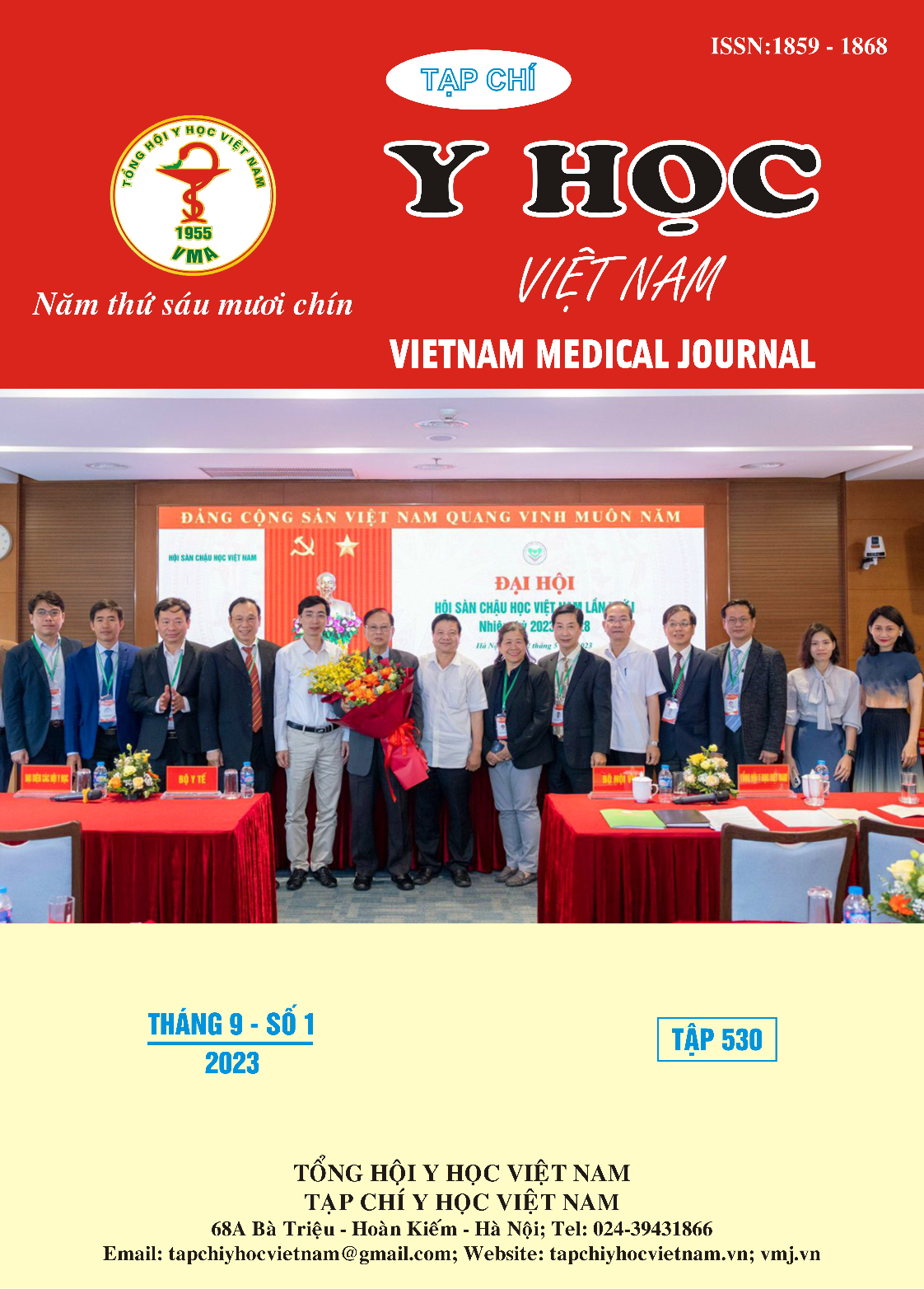RESULT OF FIRST-LINE ERLOTINIB IN EGFR MUTATION METASTATIC NON-SMALL CELL LUNG CANCER PATIENTS AT NGHE AN ONCOLOGY HOSPITAL
Main Article Content
Abstract
Objectives: Assessing the clinical and subclinical features and results of first-line erlotinib in EGFR mutation metastatic non-small cell lung cancer patients at Nghe An Oncology Hospital. Methods: Retrospective and prospective description of 74 patients with metastatic non-small cell lung cancer EGFR activated mutation were diagnosed and treated with first-line erlotinib at Nghe An Oncology Hospital from January 2017 to May 31, 2023. Results: Mean age was 61.9 ± 11.5, and female/male was 1.96/1. The majority of performance status was ECOG 0-1 (78.4%). Chest pain and dry cough were the most common clinical feature for 79.7% and 59.5% respectively. The rate of oligometastatic (55.4%) and including 51.4% bone, 43.2% pleural, and 25.7% brain metastasic. The mean time to treatment failure of erlotinib was 13.8±8.7 months. The overall response was 75.7% and the disease control rate was 90.5%. The number of metastatic organs, liver metastases, and dermatologic adverse events are factors related to the response rate (p<0.05). Conclusions: Metastatic non-small cell lung cancer is more prevalent in middle-aged and older people with the common presentation of chest pain and dry cough. First-line erlotinib in metastatic non-small cell lung cancer EGFR with mutation high overall response rate, accounted for 75.7% and high control disease, 90.5%.
Article Details
Keywords
non-small cell lung cancer, EGFR, first-line erlotinib, tyrosine kinase inhibitors (TKIs).
References
2. Bộ Y tế (2020). Hướng Dẫn Chẩn Đoán và Điều Trị Một Số Bệnh Ung Bướu. Nhà xuất bản Y học; trang 867.
3. Nguyễn Hoài Nga, Bùi Diệu, Trần Văn Thuấn, và CS (2014). Một số đặc điểm dịch tễ, lâm sàng, cận lâm sàng ung thư phổi nguyên phát chẩn đoán điều trị tại bệnh viện K trong 10 năm từ 2001 đến 2010. Tạp chí Ung thư học Việt Nam. Số 2, 7.
4. Lê Thu Hà (2017). Đánh giá hiệu quả thuốc erlotinib trong điều trị ung thư phổi biểu mô tuyến giai đoạn muộn. Luận án Tiến sĩ Y học. Trường Đại học Y Hà Nội.
5. Đỗ Hùng Kiên, Nguyễn Thanh Hoa, Nguyễn Văn Tài (2020). Đặc điểm lâm sàng, cận lâm sàng và kết quả điều trị erlotinib bước một trên bệnh nhân ung thư phổi không tế bào nhỏ có đột biến EGFR thường gặp tại bệnh viện K. Tạp chí Y học Việt Nam. tập 497, tháng 12, số chuyên đề ung thư,220-229.
6. Rosell R, Carcereny E, Gervais R, et al. Erlotinib versus standard chemotherapy as first-line treatment for European patients with advanced EGFR mutation-positive non-small-cell lung cancer (EURTAC): a multicentre, open-label, randomised phase 3 trial. Lancet Oncol. 2012;13(3):239-246.
7. Zhou C, Wu YL, Chen G, et al. Erlotinib versus chemotherapy as first-line treatment for patients with advanced EGFR mutation-positive non-small-cell lung cancer (OPTIMAL, CTONG-0802): a multicentre, open-label, randomised, phase 3 study. Lancet Oncol. 2011;12(8):735-742.
8. Petrelli F, Borgonovo K, Cabiddu M, Lonati V, Barni S. Relationship between skin rash and outcome in non-small-cell lung cancer patients treated with anti-EGFR tyrosine kinase inhibitors: a literature-based meta-analysis of 24 trials. Lung Cancer. 2012;78(1):8-15.


